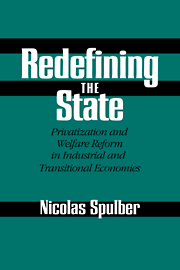Book contents
7 - Contraction versus Expansion of the Scope of the State
Published online by Cambridge University Press: 29 March 2010
Summary
The Underlying Issues
From the viewpoint of the twenty-first century, what are the prospects concerning the scope of the state – both in the developed industrialized countries of the West, the G7, and in the transitional economies from command-andcontrol to markets on which I have chosen to focus, namely the Russian Federation and the USSR's former East European satellites? Will the economic developments in the West lead to a further decline in the role of the state, not only with regard to public ownership and welfare but also in other respects, or will they rather tend to push toward combinations of various reductions with new extensions of the functions of the state? And as far as the indicated East European countries are concerned, will further reshaping and institutional adaptations of the state machines bring them closer to a free market economy like that of the United States, or rather to dirigiste economies in which the state always plays a decisive role as owner, regulator, and manipulator of firms that are mostly weak, though market oriented?
In order to tackle these crucial, all-encompassing questions, one must first identify the underlying issues concerning not only the actual but also the potential impact of a range of transformations that have taken place at an accelerating pace – in the West particularly since the late 1970s, and in the East since the middle to late 1980s.
- Type
- Chapter
- Information
- Redefining the StatePrivatization and Welfare Reform in Industrial and Transitional Economies, pp. 193 - 220Publisher: Cambridge University PressPrint publication year: 1997

